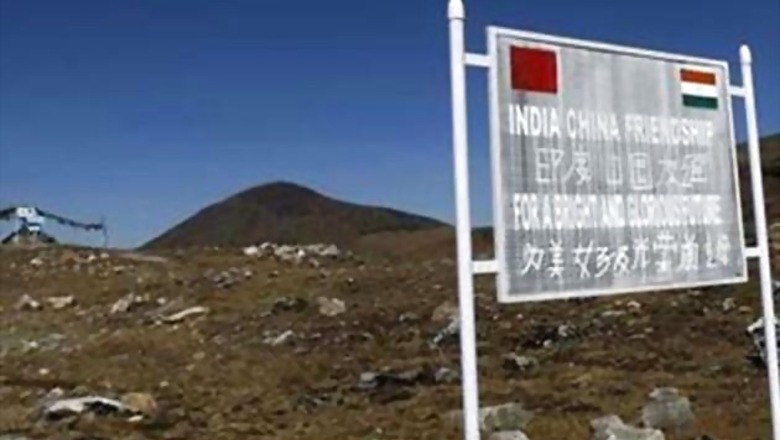
views
The Chinese troops withdrew from their positions after camping for 20 long days on Indian territory. It is speculated that India may have agreed to dismantle certain border positions and observation posts as a quid pro quo to Chinese withdrawal. What lesson must India draw from this? Srikanth Kondapalli, professor, Chinese Studies, JNU, joined IBNLive readers for an interaction on the issue.
Q. Don't you think India should keep things secret in the media about the infrastruture development as Actions speaks louder than words? Asked by: Rakesh
A. Infrastructure projects cannot be hidden from the public view. Besides, there are also gadgets like satellite and other surveillance systems which could detect such projects. In any case the infrastructure projects should be aimed at improving the livelihood of the local people. Otherwise, if these are meant only for the military purpose, an underdeveloped country like India cannot afford such projects. In this case, Ladakh should have first rate roads, railways and airfields for improving the livelihood of the people first. Such infrastructure projects should also gel with the local environment, so that we give this to the future generations. If you have been to this area, you would realise the pristine nature of the land.
Q. How can India beat china in regional politics given the fact they are more important to our neighbours e:g Nepal? Asked by: Kavita
A. First, China is not the major factor in the Nepalese politics, history, culture or economy. India still has significant influence in Nepal, although there is an undercurrent of anti-India feeling in Nepal and is sometimes expressed there in terms of seeking support from China. India-Nepal relations are still largely conditioned by the treaty that exists between the two countries since 1950s. On the other hand, China's trade with Nepal is miniscule and their investments are not much as compared to the intensive Indian interactions. It is true that China had supplied arms to Nepal in 1987 and subsequently, but these were minor, although this violated the Indo-Nepal treaty. China also had shown interest in the Lumbini project and a few hydro-electricity projects - sometimes at the cost of the Indian companies. I think India should invest more in Nepal to the benefit of the Nepalese.
Q. When, according to you, India and China had the Best of relationship and when will they have it Again? Asked by: Rohit
A. I think India-China relations never exhibited the "best" of the relationship so far as they have not resolved bilateral problems - like the territorial dispute, respective security concerns, etc. In other words, they have not reached "permanent peace" yet. It is possible that they can reach this stage if they resolve all outstanding bilateral problems. I doubt, however, this could happen in the short to medium term. Generally, Chinese point out to China-Russia relations as part of this "permanent peace", although there are still some problems that exist
Q. Why are we so timid in dealing with china, can't we be bold and assertive in dealing with them? Asked by: Col N B Chinnappa(Retd)
A. I don't think we are timid in dealing with China. In international relations, some countries keep a low profile for various relations - but mainly due to huge asymmetries in power or because the national objectives demand as such. In the case of India and China there are huge asymmetries - in economy, per capita income, literacy, health care, conventional and strategic weapons, international influence (due to UNSC membership for China), etc. Nevertheless, sometime the "weak" can also show "teeth" - as it happened on "one India" and "one China" clash in December 2010 or during Operation Checkerboard in 1987. Indian political system also differs from that of the Chinese system. In India you have to negotiate constantly with a large number of stakeholders.
Q. Why does China not settle its border with India? How does quality of leadership at New Delhi and proximity between India and United States affect China's stance? Asked by: Saurav Sarmah
A. On the territorial dispute, there are different ways of resolving this - for e.g. through war (which is ruled out in the 1993 and 1996 agreements between India and China); approaching the International Court of Justice or other legal mechanisms; or talking to the other side (which is what we have done with China thrice in 1960 and for last 31 years from 1981 till 2012). The last approach is quite long and dreary and not transparent and hence several speculations are going around on the Special Representative Talks. Both have experimented with either the principle of Mutual Understanding or Mutual Accommodation or package deal (as the Chinese side suggested) or the sector-by-sector approach (as the Indian side suggested), or swap principle (as the Chinese side suggested in 1959 or 1980) or "fair, reasonable and mutually acceptable" (as the Indian side suggested). The road map of these talks is not clear and hence the overall territorial dispute punctures any bonhomie in the bilateral relations. China is today not keen to resolve this as nationalism is rising there on "southern Tibet" and India is equally unprepared as we have coalition governments int he last two decades. So this is the crux of the problem. In the meanwhile, both countries are expanding their "capacities". On the US role, in 1962, the US officials clarified that McMahon Line should be the basis of the territorial limits between the two countries in the Eastern Sector.
Q. Have they Really gone back to status Quo Asked by: kiran
A. It is not clear from the official statements whether the Chinese troops have gone back to the status quo. The Indian Northern Army Command statement said: "Our troops have moved one kilometre backwards from the position they were on since April 16" Further, "Chinese troops have also moved away from their position they were holding on since April 15 when they intruded in Indian territory." However, this statement is not clear on how far the Chinese troops have gone back.
Q. The fact remains we cannot take on China militarily as China. The only alternative for India is to take the support of USA, which is the only super power in the world. To me USA ONLY can ask China not to cross lakshman rekha. Then why the fuss, is not right on the part of India to seek US help? Asked by: mohan
A. China was weak in the 1950s yet it took on the US-led UN forces in the Korean Peninsula (of course with North Korean and Soviet backing). A stalemate ensued - which still continues on the 38th parallel. There are so many other instances where the weak fought against the strong in human history! On the US factor, it is not clear whether the US will stand by India (assuming such talks ever have taken place!). The current case of Senkaku Islands is suggestive that US may not back to the hilt its own allies - in this case Japan. Today the US and China relations are so enmeshed together that it appears that the US takes into consideration at least some of the Chinese views. This is a part of the Group-2 phenomenon. Towards Japan and South Korea, the Chinese follow the strategy of Yuanjiao jingong - befriend distant states while attacking those who are located near]- i.e dealing with the US to address South Korea and Japan. This policy had been quite successful in creating a wedge between the US and Japan. So you need to be careful!
Q. What is the primary motive/reason behind such provocation ? What kind of political mileage do countries achieve by being aggressive and creating an environment of 'war' ? Asked by: Daksh
A. It is not clear why China acted the way it did from April 15 till May 5 at Depsang. We can only surmise: 1. to test the resolve of the Indian leadership (how the civil and military components would respond in the crisis situation), so that in a future conflict these could be factored in by China; 2. to test Indian responses (quick or decisive or slow); 3. to expand the Line of Actual Control which is fuzzy now and so one or the other party can forcibly extend the line into the other's territories; 4. to protect strategic assets being built in Pakistan controlled Northern Areas and PoK and in Tibet, etc. The PLA perhaps could have achieved many of the above objectives in the Depsang stand-off but it had also created conditions for further animosity in India. If the 1962 clashes created a constituency in India which is against China, Depsang incident could easily fuel such feelings at the popular level. So strategically a mis-adventure for China!
Q. If there are no clear demarcation of boundaries, how can anybody claim 'infiltration'? Why are the boundaries not being drawn? Asked by: Daksh
A. Excellent question. If you may recollect, the word "transgression" was used and not "infiltration"- the latter denoting some one entering into a legally defined boundary. This is the crux of the problem between India and China- there is no legally defined Line of Actual Control and the efforts of the officials on both sides to clarify such line. After the definition of the line, follows delineation and demarcation. So a long way to go. In the meanwhile both will transgress into the other's lands and we could as well see another Depsang!
Q. Do you feel that China may have done some deal against withdrawal of their troops and Indian government may be hiding the fact to show its winning position? Asked by: Raju
A. It is not clear whether there was a deal. There is no information from the Govt on this issue. Maybe the issue will be raised int he parliament. In any case we could get to know about this - of course after some time. I wrote at Rediff.com yesterday as follows: It is also not clear if the Indian side had agreed with China on the latter's three main demands viz., to stop infrastructure projects in Ladakh, discontinued patrolling up to the Line of Actual Control, de-activating the Daulet Beg Oldi, Fukche and Nyoma airfields. Similarly it is not clear if there is a reciprocal demand that China should stop such projects in Tibet, adjoining the Line of Actual Control. Ground level situation in the coming months and years will indicate the variations and compromises, if any.
Q. When is India planning to complete infrastructure development on China border? Asked by: Jayesh
A. The Border Roads Organisation and GREF are tasked with these road projects in the Eastern, Middle and Western sectors. They announced that nearly 50 percent of the work is done. We need to strengthen such work.




















Comments
0 comment